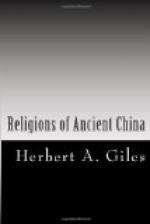The final state is best described by a poet of the ninth century A.D.:—
Like a whirling water-wheel,
Like rolling pearls,—
Yet how are these worthy
to be named?
They are but illustrations
for fools.
There is the mighty
axis of Earth,
The never-resting pole
of Heaven;
Let us grasp their clue,
And with them be blended
in One,
Beyond the bounds of
thought,
Circling for ever in
the great Void,
An orbit of a thousand
years,—
Yes, this is the key
to my theme.
Debased Taoism.—This view naturally suggested the prolongation of earthly life by artificial means; hence the search for an elixir, carried on through many centuries by degenerate disciples of Taoism. But here we must pass on to consider some of the speculations on God, life, death, and immortality, indulged in by Taoist philosophers and others, who were not fettered, as the Confucianists were, by traditional reticence on the subject of spirits and an unseen universe.
Spirits must exist.—Mo Tzu, a philosopher of the fourth and fifth centuries B.C., was arguing one day for the existence of spirits with a disbelieving opponent. “All you have to do,” he said, “is to go into any village and make enquiries. From of old until now the people have constantly seen and heard spiritual beings; how then can you say they do not exist? If they had never seen nor heard them, could people say that they existed?” “Of course,” replied the disbeliever, “many people have seen and heard spirits; but is there any instance of a properly verified appearance?” Mo Tzu then told a long story of how King Hsuan, B.C. 827-781, unjustly put to death a Minister, and how the latter had said to the King, “If there is no consciousness after death, this matter will be at an end; but if there is, then within three years you will hear from me.” Three years later, at a grand durbar, the Minister descended from heaven on a white horse, and shot the King dead before the eyes of all.
Traces of Mysticism.—Chuang Tzu, the famous philosopher of the third and fourth centuries B.C., and exponent of the Tao of Lao Tzu, has the following allusions to God, of course as seen through Taoist glasses:—
“God is a principle which exists by virtue of its own intrinsicality, and operates spontaneously without self-manifestation.
“He who knows what God is, and what Man is, has attained. Knowing what God is, he knows that he himself proceeded therefrom. Knowing what Man is, he rests in the knowledge of the known, waiting for the knowledge of the unknown.
“The ultimate end is God. He is manifested in the laws of nature. He is the hidden spring. At the beginning of all things, He was.”
Taoism, however, does not seem to have succeeded altogether, any more than Confucianism, in altogether estranging the Chinese people from their traditions of a God, more or less personal, whose power was the real determining factor in human events. The great general Hsiang Yu, B.C. 233-202, said to his charioteer at the battle which proved fatal to his fortunes, “I have fought no fewer than seventy fights, and have gained dominion over the empire. That I am now brought to this pass is because God has deserted me.”




